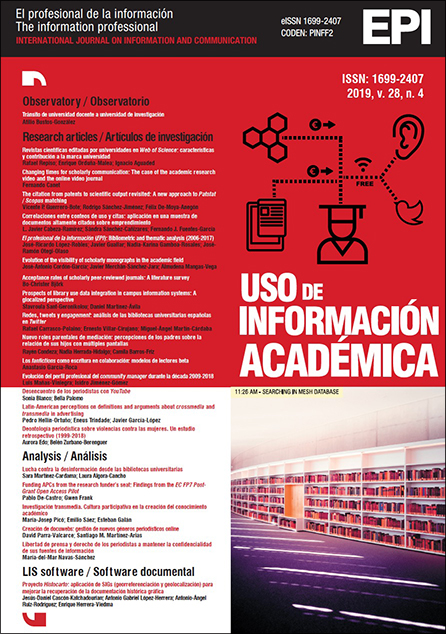Fighting disinformation from academic libraries
DOI:
https://doi.org/10.3145/epi.2019.jul.12Keywords:
Post-truth, Fake news, Disinformation, Trust, Social media, Higher education, University libraries, Academic libraries, Media literacy, Information literacy, Infomediation, Spain.Abstract
The potential role of university libraries in raising awareness about fake news and its problems is addressed. For this, a study that allows to know the current work and actions developed by the Spanish university libraries regarding this phenomenon was carried out. A questionnaire was sent to the 75 public and private universities in Spain. The response rate was 56%. The results show concern about the phenomenon of disinformation in higher education and highlight the necessary role of libraries as infomediarian agents. This study is an approximation based on data on the current relationship between university libraries and the phenomenon of post-truth in the Spanish library framework.
Downloads
References
ACRL (2016). Framework for information literacy for higher education. Association of College and Research Libraries. http://www.ala.org/acrl/standards/ilframework
Anderson, Rick (2017). "Fake news and alternative facts: five challenges for academic libraries". Insights, v. 30, n. 2, pp. 4-9. https://doi.org/10.1629/uksg.356
Álvaro, Sandra (2017). "Noticias falsas: compartir es curar". CCCB LAB. Investigación e innovación en cultura, 7 marzo. http://lab.cccb.org/es/noticias-falsas-compartir-es-curar
Banks, Marcus (2016). "Fighting fake news: How libraries can lead the way on media literacy". American libraries, 27 Dec. https://americanlibrariesmagazine.org/2016/12/27/fighting-fake-news
Batchelor, Oliver (2017). "Getting out the truth: The role of libraries in the fight against fake news". Reference services review, v. 45, n. 2, pp. 143-148. https://doi.org/10.1108/RSR-03-2017-0006
Burkhardt, Joanna M. (2017). "How fake news spread: Combating fake news in the digital age". Library technology reports, v. 53, n. 8, pp. 10-13. https://journals.ala.org/index.php/ltr/article/view/6498
Caulfield, Mike (2017). Web literacy for student fact-checkers. https://webliteracy.pressbooks.com
Caridad-Sebastián, Mercedes; Morales-García, Ana-María; Martínez-Cardama, Sara; García-López, Fátima (2018). "Infomediación y posverdad: el papel de las bibliotecas". El profesional de la información, v. 27, n. 3, pp. 891-898. https://doi.org/10.3145/epi.2018.jul.17
Collins Dictionary (2017). "The Collins word of the year 2017 is"¦ Fake news". Collins dictionary. https://www.collinsdictionary.com/word-lovers-blog/new/collins-2017-word-of-the-year-shortlist,396,HCB.html
Comisión Europea (2018). Final report of the High Level Expert Group on Fake News and Online Disinformation. https://ec.europa.eu/digital-single-market/en/news/final-report-high-level-expert-group-fake-news-and-online-disinformation
Corner, John (2017). "Fake news, post-truth and media - political change". Media, culture & society, v. 39, n. 7, pp. 1100-1107. https://doi.org/10.1177/0163443717726743
Cooke, Nicole A (2017). "Posttruth, truthiness, and alternative facts: Information behavior and critical information consumption for a new age". The library quarterly, v. 87, n. 3, pp. 211-221. https://doi.org/10.1086/692298
Farkas, Meredith (2018). "Beyond fake news: Determining what sources to trust". American libraries, 1 June. https://americanlibrariesmagazine.org/2018/06/01/beyond-fake-news
Finley, Wayne; McGowan, Beth; Kluever, Joanna (2017). "Fake news: An opportunity for real librarianship". ILA reporter, v. 35, n. 3, pp. 8-12. https://goo.gl/i4C1BV
IFLA (2017). "Alternative facts and fake news. Verifiabiblity in the information society". IFLA. https://blogs.ifla.org/lpa/2017/01/27/alternative-facts-and-fake-news-verifiability-in-the-information-society
Johnson, Ben (2017). "Information literacy is dead: The role of libraries in a post-truth world". Computers in libraries, v. 37, n. 2. http://www.infotoday.com/cilmag/mar17/Johnson--Information-Literacy-Is-Dead--The-Role-of-Libraries-in-a-Post-Truth-World.shtml
Lamb, Annette (2017). "Fact or fake? Curriculum challenges for school librarians". Teacher librarian, v. 45, n. 1, pp. 56-63. https://goo.gl/QeMdSD
Oxford Dictionaries (2016). "Word of the year 2016 is"¦ "˜post-truth´". English Oxford Living Dictionaries. https://languages.oup.com/press/news/2016/12/11/WOTY-16
Rochlin, Nick (2017). "Fake news: belief in post-truth". Library hi tech, v. 35, n. 3, pp. 386-392. https://doi.org/10.1108/LHT-03-2017-0062
Rose-Wiles, Lisa (2018). "Reflections on fake news, librarians, and undergraduate research". Reference & user services quarterly, v. 57, n. 3, pp. 200-204. https://doi.org/10.5860/rusq.57.3.6606
Shores, Mark (2018). "The alert collector: Collection development in an era of "fake news". Reference & user services quarterly, v. 57, n. 3, pp. 176-177. https://doi.org/10.5860/rusq.57.3.6601
Summers, Nick (2017). "Google will flag fake news stories in search results". Engadget, 4 July. https://www.engadget.com/2017/04/07/google-fake-news-fact-check-search-results/?guccounter=1
Stanford History Education Group (2016). Evaluating information: The cornerstone of civic online reasoning. Palo Alto: Stanford University. https://stacks.stanford.edu/file/druid:fv751yt5934/SHEG%20Evaluating%20Information%20Online.pdf
Vosoughi, Soroush; Roy, Deb; Aral, Sinan (2018). "The spread of true and false news online". Science, v. 359, n. 6380, pp. 1146-1151. https://doi.org/10.1126/science.aap9559
Zimdars, Melissa (2016). False, misleading, clickbait-y, and/or satirical "news" sources. https://docs.google.com/document/d/10eA5-mCZLSS4MQY5QGb5ewC3VAL6pLkT53V_81ZyitM/preview
Downloads
Additional Files
Published
How to Cite
Issue
Section
License
Dissemination conditions of the articles once they are published
Authors can freely disseminate their articles on websites, social networks and repositories
However, the following conditions must be respected:
- Only the editorial version should be made public. Please do not publish preprints, postprints or proofs.
- Along with this copy, a specific mention of the publication in which the text has appeared must be included, also adding a clickable link to the URL: http://www.profesionaldelainformacion.com
- Only the final editorial version should be made public. Please do not publish preprints, postprints or proofs.
- Along with that copy, a specific mention of the publication in which the text has appeared must be included, also adding a clickable link to the URL: http://revista.profesionaldelainformacion.com
Profesional de la información journal offers the articles in open access with a Creative Commons BY license.




